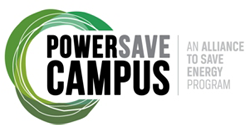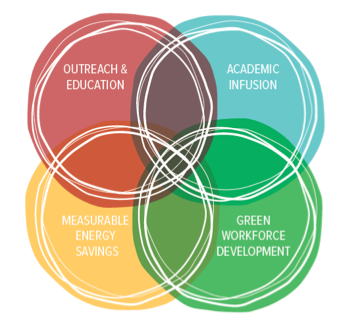PowerSave Campus Program[edit | edit source]

The PowerSave Campus program was previously named the Green Campus Program among it's 16 California College Campuses up until 2013. The PowerSave Campus name change occurred in 2013, due to an expansion of the program and issues with branding the "Green Campus" name nationally.
The PowerSave Campus Program (PSC) is a Statewide student-implemented energy efficiency program at 16 UC and CSU campuses, and has recently expanded to 7 additional campuses in the Tennessee Valley Authority. PSC is a program of the non-profit organization the Alliance to Save Energy. Since its formation in 1977 by President Jimmy Carter, The Alliance to Save Energy has been promoting energy efficiency in order to achieve a healthier economy, a cleaner environment, and greater energy security. One of the Alliance's many programs to achieve these goals in the Education sector is the PowerSave Campus Program. "The Alliance to Save Energy’s PowerSave Campus Program is funded by the ratepayers of California under the auspices of SCE, PG&E, and SempraEnergy."
The Alliance currently employs over 100 college interns annually in its PowerSave Campus program, empowering students to be tomorrow's energy efficiency leaders. PowerSave Campus interns have found their efforts reduce energy use by 3% to 22%, depending on their efforts.
The PowerSave Campus program has a well-organized program for their 23 campuses, and interns are tasked with measurably reducing energy use throughout the campus, especially campus housing. PowerSave Campus is a student-driven energy efficiency education program that promotes careers in the field, generates actual energy savings, increases awareness of the importance of energy efficiency, and encourages academic infusion of sustainability concepts. Project Coordinators are paid student interns, who develop their own projects, work with University staff and stakeholders, and implement their projects to completion, which must fall under at least one of the four program pillars.
The Four Program Pillars[edit | edit source]

PSC interns support green workforce development through training, mentoring, internships, and project based learning. Interns are required to organize at least two workforce-related events each year. Some projects completed by interns to fulfill this requirement include:
- Lectures, panels, or seminars featuring green professionals
- Greening the Career Fair
- Teaching students energy audit trainings
- Job shadowing through for-credit internships
- Green Speed Networking events
PSC interns achieve measurable energy savings through research, educational campaigns, and facilitating retrofits. This is measured by tracking metrics for actual and potential energy savings of projects and efforts on campus. Interns are required to save at least 35,000 kWh/year, and of that, at least 600 therms must be saved from the campus's use of natural gas. The other requirement of student interns is to save $35,000/year of identified cost savings associated with energy savings (this number includes actual and potential savings). These key performance indicators are achieved through:
- Retrofit projects
- Dorm and campus energy competitions
- Signing pledges
Outreach and education metrics are achieved by students signing pledge sheets, sign-up sheets at events, social media outreach, class announcements, and more. Each PSC team is required to outreach directly (face-to-face) to at least 5% of the student body, and outreach indirectly (website hits, social media, etc.) to 50% of the student body. These metrics are achieved by:
- Promoting events through class announcements, flyers, radio broadcast, etc.
- Having sign-up sheets at all tabling activities and events, asking for students e-mail addresses
- Pledges
- The Program counts unique interactions, not unique people
Academic Infusion includes projects and efforts that brings energy efficiency and sustainability into the classroom academics. PSC interns are required to have at least one faculty member per year working with them on an academic infusion project. These projects include:
- Working with a faculty member to take over their class for anywhere from 5 minutes to a couple of weeks
- Sticker design contest in a graphic design class to produce PSC marketing materials
Additionally, PowerSave Campus interns are required to annually host at least one stakeholder meeting, produce 9 monthly newsletters, produce a Project Implementation Plan before every project, and produce an Event Evaluation after each project is completed.
PowerSave Campus Websites[edit | edit source]
Please refer to these PSC websites for current and past projects, pictures, and contact information.
Cal Poly Humboldt
Cal State University, Chico
University of California, Merced
University of California, San Diego
California State University, Berkeley
University of California, Santa Barbara
Cal Poly, San Luis Obispo
Green_Campus:_Humboldt_State_University
